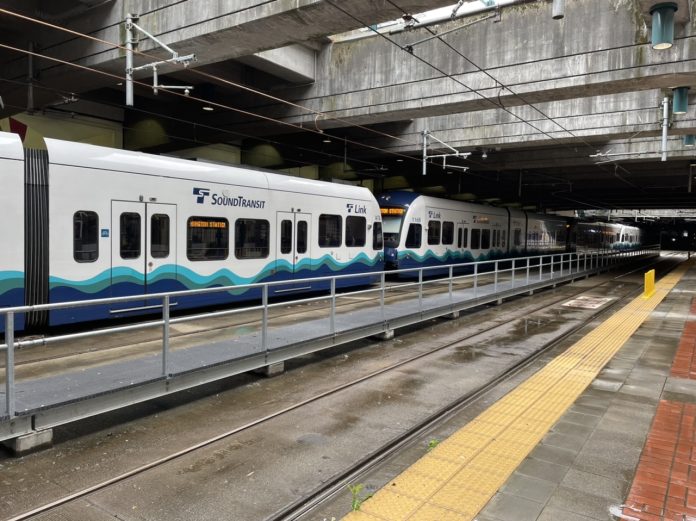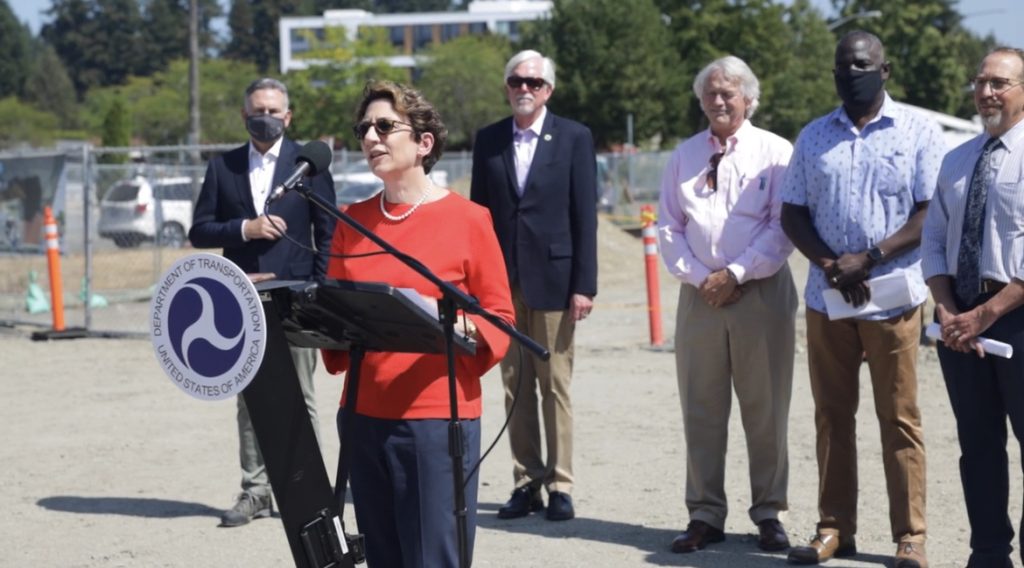
Author’s Note: The United States Department of Transportation announced larger savings from the loan deal on Friday, September 17th totaling $630 million.
Sound Transit delivered a batch of positive news today when the agency shared that it anticipates $500 million in savings from federal financing tools. Polly Trottenberg, Deputy Secretary of the United States Department of Transportation (USDOT), joined for the announcement in Downtown Redmond.
The $500 million in savings comes from a package of loans from the Transportation Infrastructure Finance and Innovation Act (TIFIA) program administered by the USDOT. Five current TIFIA loans are being refinanced along with a new TIFIA loan authorization for the Downtown Redmond Link extension that together total $3.84 billion. All of the loans benefit from historically low interest rates allowing for the large long-term savings.
Projects among the five current TIFIA loans include the Northgate Link, East Link, Lynnwood Link, and Federal Way Link extensions as well as the Operations and Maintenance Facility East project in Bellevue.

“This is the largest package of loans that USDOT has ever approved for a single borrower,” Trottenberg said. “I think it just shows our tremendous commitment to expanding transit around the country and I think to the growth and innovation of this region.” She also added that the full suite of projects “would be creating 30,000 jobs directly and 60,000 jobs in increased economic activity.”
Speaking on the news, too, Sound Transit CEO Peter Rogoff heralded the deal. “This historic extension of our TIFIA partnership with USDOT will create more than $500 million in savings for our region’s taxpayers, helping us deliver the largest transit infrastructure program in the country as quickly as we can,” he said. “With our population growing and our planet warming, the stakes are high, and we are creating truly impactful benefits. We thank USDOT and our congressional delegation for their dedicated leadership toward making our transit expansions possible.”
Earlier this summer, Sound Transit had suggested savings from TIFIA loan refinancing and the new Downtown Redmond Link TIFIA loan could range from $70 million to $380 million. Yet, today’s announcement puts the savings $120 million higher than even the rosiest estimate.
These savings will certainly be helpful in financing the Sound Transit 3 (ST3) capital program that in July was assumed to have a $6.5 billion affordability gap. Today’s announcement should mean that the affordability gap will be reduced, but just how much is still unclear.
“While we’re conservatively saying the USDOT actions will provide more than $500 million in savings for taxpayers, it’s not straight-across math in terms of how the affordability gap will change,” said Geoff Patrick, Sound Transit’s Deputy Executive Director of Communications and External Affairs. “That is because some of those savings will occur during further-out years when we aren’t running up against borrowing limits. But most of the savings will go toward reducing the affordability gap, and it is certainly tremendously good news.”
Patrick also told The Urbanist that the agency would get updated financial forecasts in the fall that include savings from the TIFIA loans. That information will include the actual interests that apply to the loans when they’ve been formally closed.
While the reduced affordability gap remains unknown for the time being, savings like these are critically important to delivering ST3 projects closer to their original timelines.
This month, the agency’s board of directors approved a hybrid realignment for the ST3 program. That realignment came with two sets of adjusted project dates: affordable schedule and target schedule dates. The latter are the most robust and keep most projects on or near their original timelines, except generally where “planning delays” have pushed projects back and where parking projects have been bifurcated and pushed toward the end of the program.
Looking ahead, there will be other opportunities for Sound Transit to close its affordability gap, including individual projects competing for grants through the USDOT. The Bipartisan Infrastructure Bill (Infrastructure Investment and Jobs Act) could hasten the speed and amount of grants that the agency could become eligible for since it would essentially double the annual funding levels for the Capital Investment Grants program, which supports transit expansion projects. Sound Transit has also said that federal formula grants for the agency through Fiscal Year 2026 would increase to $360 million, which is about $50 million higher than had been assumed.
Every little bit of extra funding will make advancement of transit projects easier, particularly as the agency tries to grapple with other tools like design and construction savings.
Stephen is a professional urban planner in Puget Sound with a passion for sustainable, livable, and diverse cities. He is especially interested in how policies, regulations, and programs can promote positive outcomes for communities. With stints in great cities like Bellingham and Cork, Stephen currently lives in Seattle. He primarily covers land use and transportation issues and has been with The Urbanist since 2014.


